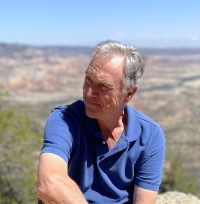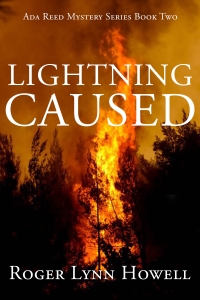The Reclamation

The war ended, and mining ended, and the town ended in short order. I was a child then and one of the last to leave Cinnabar. I’d been told we would go, that we had to. But I didn’t understand what going meant back then, not even when the electricity stopped, and the streets went dark, and our house grew silent and cold.
I rose early on the spoken day and tiptoed down a hallway full of crates and trunks, all bound with straps and marked with my father’s name but no address. We left the dishes unwashed in the sink and the fire burning in the stove. The road glistened with slush and red mud as we marched with suitcases past doors swinging open, past gaping houses and gardens gone to seed. Tarpaper hung loose from the house on the corner, torn by September winds. No one had nailed it back with chicken wire, so it draped like black flags over bare, yellowed timber. Orange flowers clung to the edges of another yard, and pumpkins and squash lay in the garden. That house wasn’t empty yet, and I strained to see if someone might be watching from inside, marking our passage. My grandmother pulled me by the hand, brooking no delay, risking no chance I might pause or look back.
Ahead of us, fleeting shafts of sunlight knifed through mist and dark pines. The door of the grocery was locked, and strangers were nailing boards over the windows. We lugged our suitcases through the town, past the Merc, which had been closed more than a year, and past the garage where all the windows were painted white. The government office was closed; the sign above the door still showed an eagle perched on an artillery shell. War Production Board, it announced. Through shattered windows, moldering posters of hard-working men and women hung on graffiti-marked walls.
At the mine portal our road dipped beneath timber loading chutes, and we took care passing under them. Workers were closing up the mine entrance at the main level, swinging big wooden doors and using bolts to set heavy iron cross bars. Grandma set down her suitcase at last, and we rested our arms and watched as the mine was shut in. The road over to Stibnite had washed out, she told me, and no one had repaired it. Her words were thin and meted out between heavy breaths, and it was odd she would confer with me like that.
We hiked a long way up the road, where the slopes oozed blood red all around us. Crimson waters ran in the road, and we jumped the rivulets and swung and dragged our suitcases through the gore. The car didn’t come for a long while, so we sat on our suitcases and I watched the town below for signs of life. Through the treetops, a lone two-track dirt road took out from the heart of town and headed away from us, northward. The road ended before it was out of sight, and I wondered if roads often start and end where you can see them. The road turned into a trail as it bent around a rocky point, but even the trail faded to a trace before it re-appeared in the next valley. I followed it with my eyes as far as I could, to where it vanished into grey, rocky canyons that joined one to another to become a deep darkness.
“Who named it the River of No Return?” I asked.
Grandma didn’t turn but sat on her suitcase with her arms around her middle. “It’s nothing to be minding now,” she scolded.
“But what explorer went down the Salmon River and learned about the canyon and everything, and then returned after all to give it that name?”
She’d been watching uphill for the car, but now drew her eyes back to the town and the canyons beyond. “It ain’t who went that named it,” she explained, “but who waited behind.”

.png)

